In defense of horrible botox
Like a niffler collecting shiny things, I’ve been stealthily hoarding quotes, anecdotes and life lessons about women’s beauty standards for years. Today I open my treasure chest and bestow all my gems
While filming a series called “Expats” Nicole Kidman snapped some photos with her co-star and posted them to Instagram with the caption, “Back at work….” Smiley face.
In response, hundreds of people told her she had horrible botox.
Horrible.
We’re gonna circle back to you Nicole, don’t you worry, but for now gather round, it’s time for woefully enduring elementary school body shame stories. (We’ve all got ‘em- throw yours in the comments!)
When I was about 10 I remember watching an episode of Full House with my family. In the episode DJ is 14. She gets invited to her friend’s swimming party. In preparation she stops eating for a week and then faints while exercising. I understood the morale of the episode was to not do that, but still somehow I came away with the exact opposite message—that in order to get by in middle school you must be skinny.
One line is seared in my brain to this day—when the “let’s learn our lesson” music starts playing at the end of the episode and DJ is talking things over with her dad Bob Saget, she tells him she wants to look like the girls in her magazines. He says she does. She responds, “Oh yeah? Well show me one girl in here with this round face and these Charlie Brown cheeks.”
Oh. Oh no…. A round face is bad? Guess who else had a round face??!! ME!! I still remember the terror that coursed through my 10 year old body. Would anyone be my friend in middle school?? The affliction of Charlie Brown cheeks… my cross to bear.
A little over a year ago the TikTok trend du jour was “what is your Roman Empire?” Apparently guys think about the Roman Empire more than any of us knew, so the trend was to voice what you think about more than anyone knows.
At that time this video came across my feed:
 Tiktok failed to load.
Tiktok failed to load.Enable 3rd party cookies or use another browser
“My Roman Empire is the fact that I have thought about the desire to be smaller every single day for the past 20 years. I call it the elevator music in my head… I’ve thought once or multiple times a day how I’d like to be smaller, I’d like to be skinnier- my arms, my belly….”
There are 3175 comments essentially all saying, “same.”
I scrolled through this comment section as I was sitting on the grey chair in my living room one night after the kids were in bed. I just kept reading and scrolling, reading and scrolling, horror-struck.
When I read one woman’s comment that her 89 year old mother dying of cancer keeps saying “at least I’ll be thin at my funeral” - something snapped in me.
ENOUGH ALREADY!
That night reading that comment section made me never ever want to spend one second wishing to be more attractive ever, ever again. What a waste! What a trap! Not how I want to spend my one wild and precious life!
This wasn’t the first “ENOUGH ALREADY” experience I’ve had thinking about the diet/beauty industry.
However.
Have you ever tried to break up with the desire to be attractive?
It’s….. not so easy.
What the body positivity movement leaves out
The body positivity movement has sprung up as a counter-movement to the skinny/beauty movement (can you call a centuries-long ever-present pressure a movement?) The body positivity movement says, “Don’t worry about your body. Don’t worry what others think of you. All bodies are beautiful. Just live for yourself!”
One of those 3175 TikTok comments from the above video says, “Just live your life and stop giving a fuck.”
They are not wrong- this commenter, the body positivity movement, the people in Nicole Kidman’s comments saying she is beautiful as she is and doesn’t need botox.
I’m all for body positivity, but I have noticed that in their zeal to bring about this Edenic body utopia where we accept ourselves fully exactly as we are, sometimes body positivity warriors leave something out:
They leave out just how many real benefits there are to being pretty and skinny.
They leave out that there are actual consequences to opting out of the beauty game.
They leave out just how taut the structural strings are that keep us tied us to the “I must be prettier” hamster wheel.
Without understanding these strings, we end up blaming ourselves when we find it surprisingly difficult to “just stop giving a fuck” about our bodies.
‘What’s wrong with me?’ we may wonder. ‘Why do I care so much whether others see me as attractive? Why can’t I stop worrying about my appearance?’
Before I understood that there is a well-oiled system in place that’s been running on the fuel of women’s insecurities for centuries - my inability to “just not care” was simply one more shovelful of shame piled onto the existing vast smoldering heap of body shame.
This article is an attempt to remove that one small piece of body shame off the heap - the “why can’t I just stop caring?” piece.
Allow me to articulate why we care so much.
It’s not you, it’s the long history of beauty as female currency
Until very, very recently in history, women were banned from owning their own homes, their own businesses, their own property, their own vote and their own money. Consequently, women had precious little to work with in the way of currency.
Denied actual power, women have used what resource they did have- their bodies. Denied social mobility, women used their beauty to attract higher-status men and move up in the world. Denied wealth, women used their hair, make-up and slim figures to attract a wealthy husband. Often her body has been a woman’s only resource, so she’s used it. Very resourceful.
Under patriarchy, a woman’s currency lies in her ability to attract a man. A woman’s currency IS her body.
Women can now own their own property and money, but the centuries-long stigma that a woman’s worth lie in her beauty, well, that has proven much harder to change.
If we had a time machine, we might be shocked to see how little has changed in the intensity of unobtainable female beauty standards in the past six centuries.
In the Book of the Courtier written in 1528, the author Baldassare Castiglione describes at length the perfect courtier and the perfect court lady in Renaissance Italy. For a courtier, the book says a suitable bachelor should be educated in languages and history, a proficient hunter and soldier.
To be an eligible bachelorette? Take a guess.
“Good looks are more important to her than to the courtier, for much is lacking to a woman who lacks beauty.”
Specifically, the most appealing court ladies had “blonde hair, rosy lips, a pale, hairless skin, white teeth and small breasts.”
And if you can believe it- these beauty requirements for women were almost always beyond the reach of actual women. (What?! So crazy!! So hard to imagine!)
What was a poor Italian Renaissance gal to do?
Well. They tried. They washed their face with donkey milk to make it whiter. They cooked alum in water and left it on their hair for days to dye it blonde. They mixed dillseed with red wine to rosy up their cheeks and lips. And to achieve that hairless skin? They just had to round up a turtle, a frog, an owl and some ants.
"To remove unwanted hair: take equal parts of the blood of tortoises, frogs, and owls, together with ant eggs, red orpiment, gomma di hellera, as much as the one as of the other, and mix it with vinegar. Apply it discreetly, so that you don’t flay yourself."
But these women were in the exact same double bind as Nicole Kidman and us modern day Renaissance women- the rules were/are: inconvenience yourself, put yourself through pain in the name of beauty, definitely be beautiful, but don’t like…. try too hard.
The next section of the courtier book is titled “what to do when your skin is burned by ointment.” Rashes and burns from beauty treatments are terribly uncomely and embarrassing for suitors to witness, so be sure to hide yourself if these ill effects should befall you.
Just have your frog blood ant egg potion work perfectly the first time, ok?
Also the church considered vanity a sin, so be beautiful, but don’t like… care. That’s a sin.
And while we’re on the topic of women’s beauty standards being unobtainable for *checks watch* all of recorded history, let’s take a gander at this very reasonable, very achievable, very short list of beauty standards from a 1655 sexual guide book called The School of Venus written by Michel Millot:
“She must be a young lass of seventeen or eighteen years old, pretty plump, and a little inclined to fat, straight, and of a good stature and majestical looks, having a well proportioned and noble face, her head well set on her shoulders, sparkling eyes, with a sweet and pleasant alpect, her mouth rather of the bigger size than too little, her teeth even and very white, her forehead indifferent, and without frowns, her cheeks well filled up, black hair and a round face, her shoulders large and of a good breadth, a fine plump and smooth neck, hard breasts, that hang not down, but support themselves like ivory apples, an arm proportionale to the rest, a skin neither too white nor too tawny, but between both, and so filled with flesh that it hangs not loose, a hand white as snow and well set on at the wrists... her stomach must be soft and fleshy, fine small feet turning out at the toes... her calf of her leg plump, and large about the middle, small and short knees, substantial and tapered thighs, on which must hang a pair of round buttocks, a short rump, and slender waist."
Breasts that support themselves like apples…. thanks for that one Michel.

It’s not you, it’s survival of the prettiest
Compared to last century, this century has way less tolerance for putting up with verbal body shaming. I don’t think that episode of Full House would air today for instance. The 90s were dark times for the prevalence of uncensored policing of women’s bodies.
But body shaming hasn’t gone away. It’s just moved underground. Where it’s harder to detect. Loving your body is the new hating your body.
While verbal body shaming is out, systemic body shaming is still very much in. Pretty privilege is alive and well.
*cue a depressing montage of pretty privilege studies set to The Full House theme song “Everywhere you look… ba-du-ba-da-bop-bow-wow.”
In 2011 the Journal of Applied Psychology published a study looking into how attractiveness affects how much you are paid.
They found that weight affected a woman’s pay much more than it affects a man’s. Specifically they found that:
“Very thin” women earned on average $22,000 more than average weight women.
“Thin” women earned $7000 more than average weight women.
“Heavy women” earned $9000 less than average weight women.
“Very heavy” women earned $19000 less than average weight women.
A 2009 study had people rank a series of four of attractive and unattractive photographs asking how trustworthy they looked. “Results indicated that attractive individuals were seen as more trustworthy than unattractive individuals and women were seen as more trustworthy than men. When participants were forced to choose among the four pictures in a trust scenario, they overwhelmingly chose the attractive females.”
In 2013, one study followed up with 1515 participants from a Youth Cohort Study twenty years before. They found that the participants who were rated more attractive at age 15 had higher IQs at age 36 and higher socioeconomic status than their less attractive peers.
A 2021 study found that attractive women were perceived to have more moral traits than unattractive women. More morals!
A 2022 study found that attractive female students received higher grades than less attractive female students, BUT when in-person classes switched to online and cameras were off- the attractive female students grades declined.
Higher grades, higher income, higher IQ, perceived as more trustworthy AND as having more morals?!
THERE IS A REASON NICOLE KIDMAN IS GETTING THE BOTOX PEOPLE!
Do you think she would be able to land a role as Zac Efron’s love interest, a man 20 years her junior if she wasn’t skinny and pretty?
She would not.
Do you think she would continue to earn millions as a 57-year-old actress if she opted out of the beauty game?
She would not.
And if she does ever stop getting botox, we would judge her for that too.
It’s not you, it’s the cult of “normal”
Because I cut my own hair, because I never paint my nails, because I’ve never purchased any service or product in the name of wrinkle-reducing, because I regularly drink sugary lattes without remorse and because I buy my cosmetics at Target instead of Sephora, I like to think myself a very plain Jane when it comes to my beauty regimen.
Just call me Laura Ingalls Wilder, it’s basically Little House on the Prairie over here.
I mean I ONLY wear foundation, eye brow gel, bronzer and a little blush on the daily. Mascara is for special occasions. (Feel special if you see me wearing mascara).
And I’ve never gotten fake eyelashes, but I have googled it.
I don’t wear those shiny under-eye masks the pretty girls wear to bed, but I do kinda want to.
I did buy one of those satin tube hair thingies when the Gen Z girls on TikTok told me to, and now I go to bed looking like wizened unicorn even though it’s kind of uncomfortable to sleep in.
And I do own off-brand Skims.
So.
Maybe a little less Little House on the Prairie, a little more Gilmore Girls? But because I’m not trying to keep up with the Kardashians, I’m lulled into a sense of being below the “doing too much” line on the beauty regimen scale in my head.
Funny thing about scales in heads- we always tend to fall just a little better than average.
Normal is so very relative.
This week for instance I read an article by
who admitted that last year she spent over $11,000 and 145 hours on her lashes, nails, facials and dermal injections. Not including haircuts, highlights, red light treatment, cryotherapy, makeup or skincare.However, living in corporate LA, this was completely normal- better than average even:
“I lived in Los Angeles, which made all this maintenance completely normal for those around me. I was maybe even below the median of the girls I knew in the city—or the ones I knew in New York—I didn’t get any cosmetic surgeries done, for example.”
Normal is relative.
One thing we do all have in common as females in the 21st century though- natural is abnormal.
Letting your natural leg and armpit hair grow as it naturally would is considered extreme. Extremely abnormal.
Going to work as your natural self- without your makeup and hair done- is considered unprofessional. (This makes me want to pull all my carefully unicorn-rolled hair out.)
Just existing normally in a normal body for women is abnormal and you will pay the price for your abnormality. (See: Survival of the prettiest).
If you scroll up a few weeks, you’ll notice that the first comment next to Nicole Kidman’s face reads “…don’t turn yourself into something unnatural.”
Girl, our baseline is unnatural.
We are primates. Naturally, we would exist like this:
But at our current advanced level of evolution, if you are female- natural is abnormal, and unnatural is normal:
Don’t turn yourself into something unnatural? Too late! There are consequences- in friendship formation, dating, and work- if we don’t turn ourselves at least a little into something unnatural.
The appropriate level of adhering to unnatural beauty standards is like threading a string through the eye of the tiniest needle. Get the botox, but don’t have anyone be able to tell you got the botox. Get the plastic surgery but don’t talk about it! Wear makeup, but not too much! Spend thousands of dollars and hours of your time on how you look, but don’t like… care how you look.
Cue the Barbie monologue, it’s basically impossible to be a woman.
And that’s on purpose.
It’s not you, it’s that women’s insecurity is a $528.6 billion dollar business
Ever heard of the pink tax? Walk into any pharmacy and the razors, shampoo, deodorants, body washes and lotions that are marketed to women will cost more than the ones for men even when there is the exact same goop inside the bottles.
Products for women cost more. Plus, there’s a heck of a lot more of them.
What’s the cost of female beauty?
There are different estimates, but over the course of a lifetime most women will spend between $150,000 to $300,000 more than men just by virtue of being a woman.
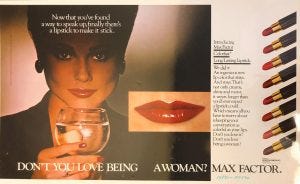
“Anti-aging is the ultimate capitalist goal, because it can never be met, right? It’s physically impossible to anti-age. And to try to anti-age is to be a consumer for life.” -Jessica DeFino
Who benefits from women’s beauty?
Billion dollar make-up companies, diet companies, hair care companies, so many companies are deeply invested in keeping women feeling bad about their looks.
The book Advertising the American Dream explains how advertising executives in the 1940s, 50s and 60s explicitly taught their workers to heighten female insecurity. One company said that their principle audience was “vats of frothy pink irrationality” with a “natural inferiority complex.”
And they were… not subtle about it.



Listerine, face bras and ironized yeast are not the only ones benefitting off of women’s insecurity. Systems of power are also deeply rewarded by and thus deeply invested in keeping half the population focusing their time, energy and money on being thin and beautiful.
“A cultural fixation on women’s thinness is not an obsession with female beauty but an obsession with female obedience.
Dieting is the most potent political sedative in women’s history. A quietly mad population is a tractable one.” - Naomi Wolf, The Beauty Myth
Woof Wolf, what a quote!
Capitalism may well win the gold medal of the beauty Olympics, but there are other systems in the victor’s circle. Here are a few other systems of power that benefit from keeping women focused on beauty:
Classism. All those procedures, pilates classes, personal trainers, Ozempic and retinol moisturizers are all very expensive. So much of pretty privilege disproportionately flows towards middle and upper class women because they are the ones would can afford to be pretty.
Ageism. The beauty industry is synonymous with anti-aging. An older woman is the worst thing you can become. (I’ve got terrible news for you.)
Ableism. The beauty industry keeps the standard set on able bodies as beautiful and has little tolerance for deviations from the norm.
Patriarchy. Women will never accumulate power when we are convinced that our greatest contribution to the world is our beauty. Patriarchy has been so successful in convincing women that our worth hinges on our physical appearance, that now we don’t need governments or clergy to keep us in line, we willingly sacrifice our dollars, hours, focus and attention on our appearance all by ourselves.
Racism. Beauty standards are based on whiteness and white women. Skin lightening and brightening for instance is a $8.6b industry globally. Our country has an ugly history of discriminating against black women for wearing their hair naturally. Women of color must work twice as hard and pay twice as much to conform to white beauty standards. Then they are punished when they opt out.
“Black women are not generally in the beauty hierarchy considered ‘women.’ We are masculinized for lots of reasons- skin tone, physical features, height, weight, but really because of the overwhelming power of the controlling images that say that black women are not feminine women…. Beauty standards are a signal that say ‘see how willing I am to conform.’” - Tressie McMillan Cottom
"... with respect to the female character, obedience is the grand lesson which ought to be impressed with unrelenting rigour."
“Taught from their infancy that beauty is woman's sceptre, the mind shapes itself to the body, and roaming round its gilt cage, only seeks to adorn its prison. - Mary Wollestonecraft, Vindication of the Rights of Women, 1792
To live in an ideal world or in the real world?
Wouldn’t it be amazing to live in a world where women could wake up, soak in the sunshine, and set off to work without any plucking, contouring, blow drying, straightening, curling and lip sticking? Without looking in a mirror at all?
Wouldn’t it be fantastic if we could exist without carrying the heavy historical baggage of body-as-female-currency?
Wouldn’t it be incredible to just exist like the monkeys, like the turtles, like the ants without having to boot camp our bodies into the societally acceptable shape?
Wouldn’t it be grand to go an hour, a day, week, a month, a year, 10 years without once wishing to be smaller?
Wouldn’t it be swell to not have to spend $300,000 extra over the course of our lives for being female?
Wouldn’t it be awesome if natural female body hair wasn’t considered a disgusting enemy to be ripped, waxed, plucked, shaved or poisoned off?
Wouldn’t it be great to live in a world that didn’t erase women over 50?
That would be great. I wish we lived in that world.
But we don’t.
Not yet anyway. Instead we live in this world where there are very real reasons why women give a fuck about what they look like.
I wish Nicole Kidman didn’t have to count her calories and inject poison into her skin to convince us she’s thirty years younger than she is. But I understand why she does it. And I understand it’s impossible to do it perfectly.
Do with your body whatever makes you happy, but don’t think yourself crazy if you find it difficult to “just not give a fuck” about your appearance.
It’s not you. It’s the system.
Do you enjoy thinking about and discussing all things patriarchy and feminism?? cool me too! Come discuss with me and the Matriarchal Blessing community by becoming a paying subscriber. Our next zoom gathering will be in January when we will be discussing The Chalice and The Blade by Rianne Eisler.
Alternatively, you could also just pay me for my work just cause, that is also very cool and very appreciated! Thank you!








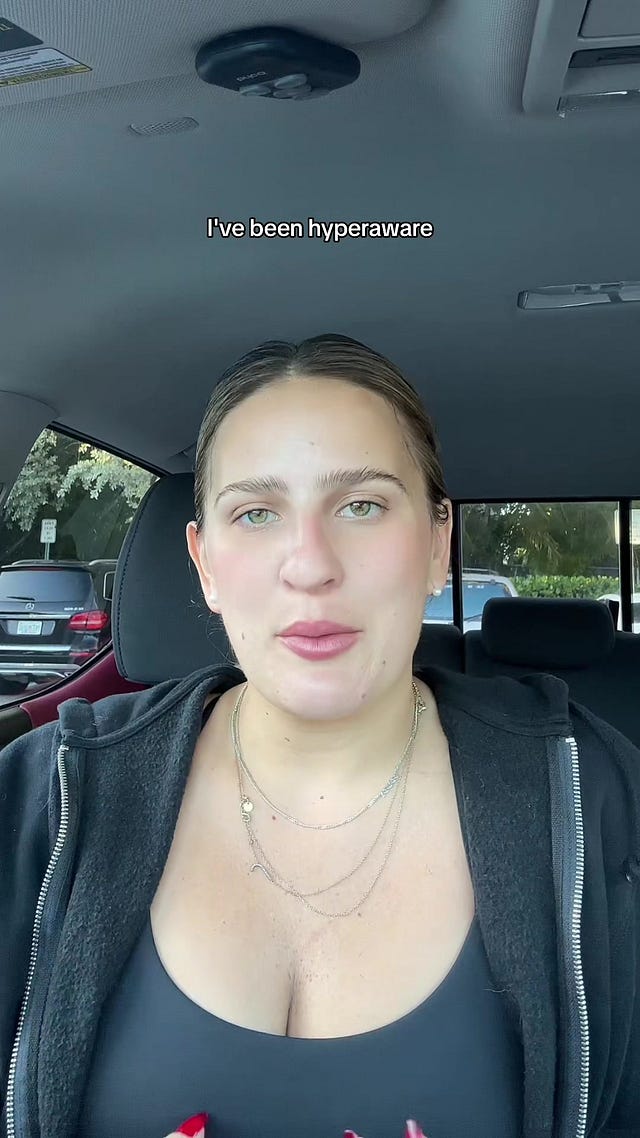



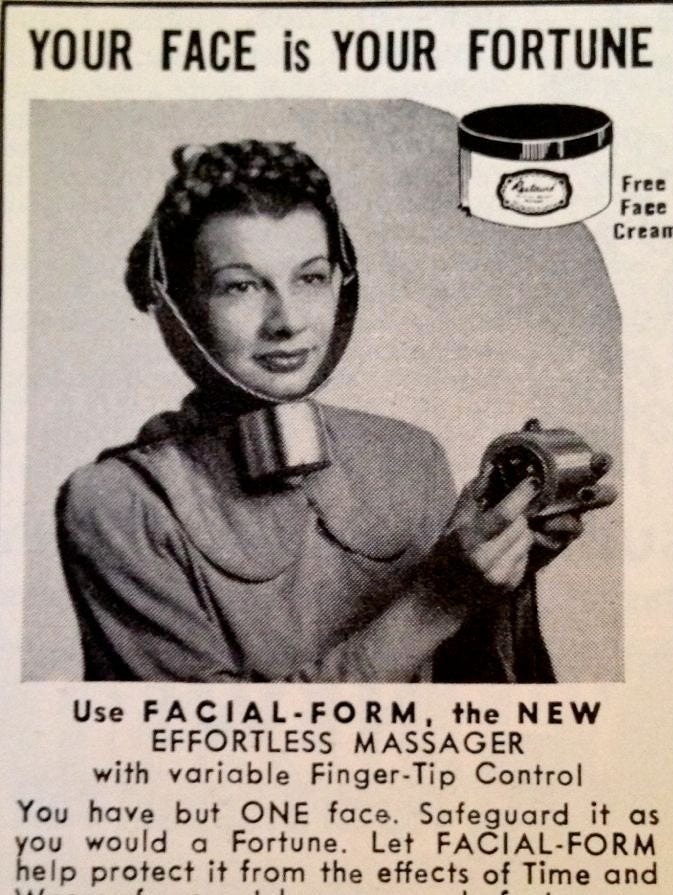
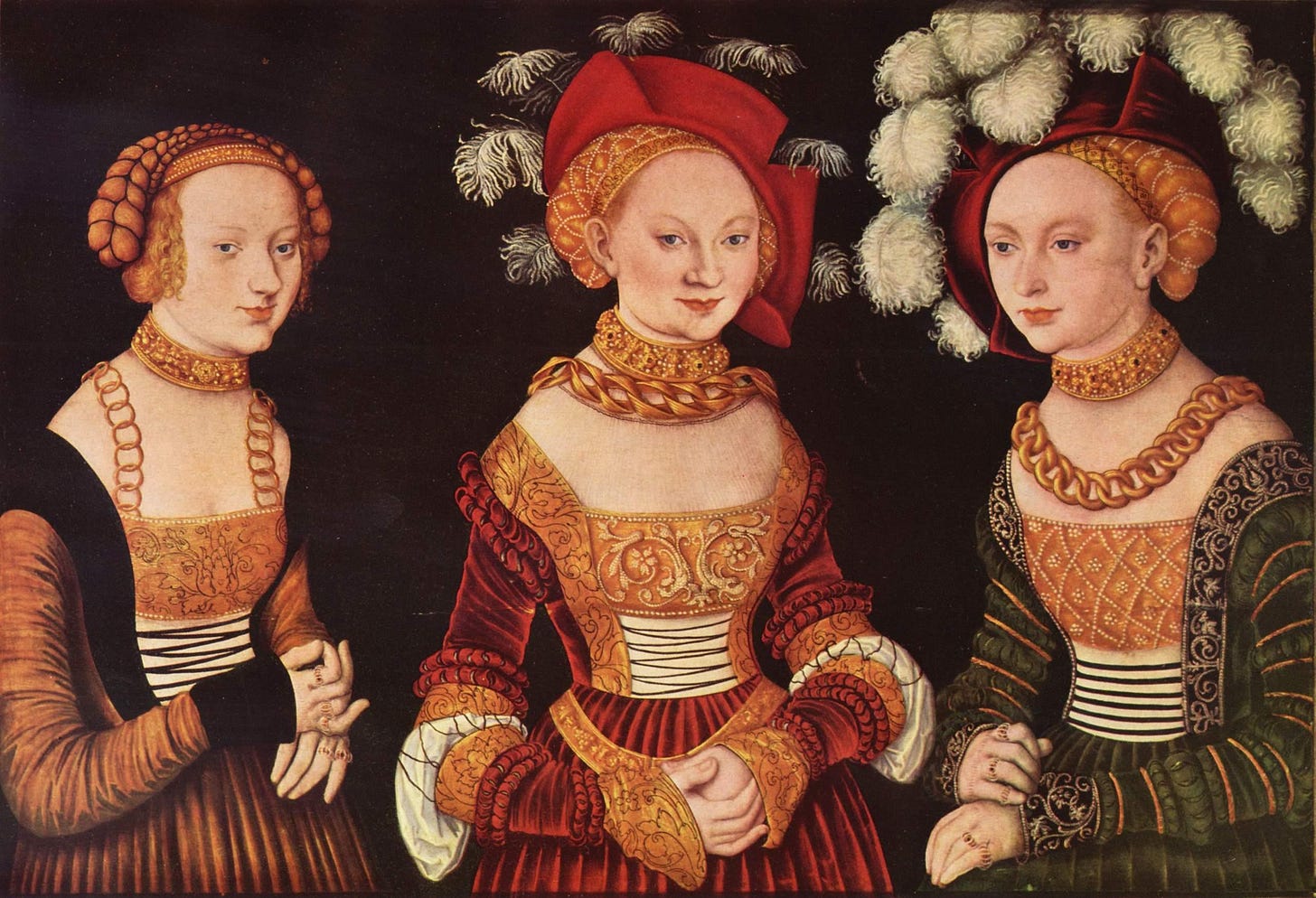
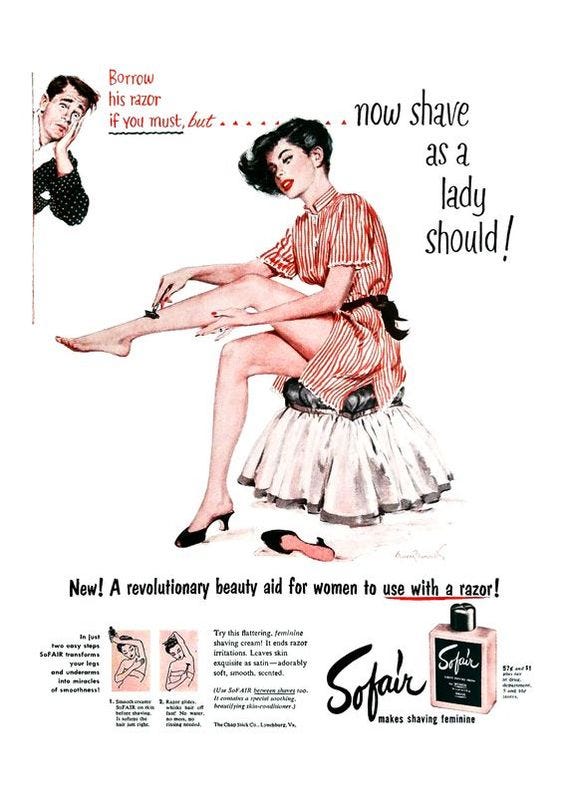


Massively appreciate this work Celeste.
Telling people what they “should do” is the easy bit. Digging deeper into the cultural forces that shape us and explaining why we find it difficult to do what we know we should is the more difficult but 100x more effective work.
I’ve said this before, but we can’t shame ourselves out of systemic scripts — the best we can do is understand them, be realistic about the costs of resisting them, and find metabolisable ways of fostering change.
Not being a woman, I've always known at some level how bullsh*t beauty standards are, but I hadn't put some of these dots together like the pink tax and the cultural requirement to use those products. The socioeconomic and class implications are eye opening too. Very well written, thank you!